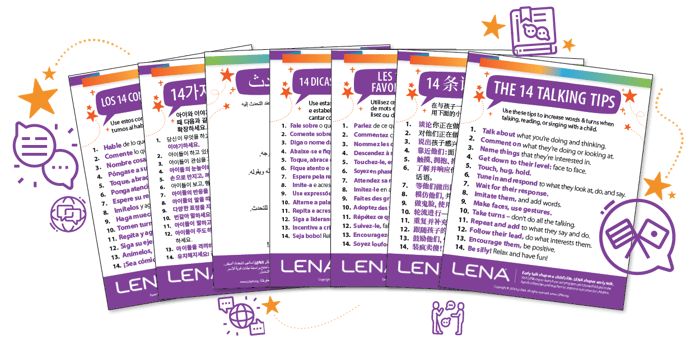Reading for Our Lives: A Literacy Action Plan from Birth to Six lays out author and early literacy advocate Maya Smart’s vision for our “collective power to raise our readers well.”
Foundational to that “collective power,” Smart says, is an early focus on something as simple as back-and-forth, serve-and-return interactions with infants and toddlers. At LENA, we call these brain-building interactions “conversational turns,” and we were intrigued to see how Reading for Our Lives connects them to early literacy.
Below, we’ve collected a handful of highlights from our recent webinar devoted to early literacy and to Reading for Our Lives.
The “road trip” to literacy
In Reading for Our Lives, Smart uses the analogy of a road trip to describe the “road to reading” for parents of young children.
To best promote early literacy skills, Smart says parents need:
- The lay of the land. This is the “10,000-foot view of how reading unfolds from infancy to early elementary school.”
- A supply of premium fuel. There’s so much new research on how a child’s brain develops early in life. Knowing about this research is powerful.
- Help with routine maintenance. It’s one thing to know about the research, but it’s another thing altogether to turn that knowledge into everyday practice.
- Access to roadside assistance. No family is an island, and “reading develops within a dynamic web of relationships and experiences.” There’s a lot parents can do themselves, and there’s a lot they need/deserve help with.
Conversation as a “lever”
Smart identifies six of the most powerful ways that parents and caregivers can promote their children’s early literacy skills: conversation, book reading, teaching, connecting, budgeting, and advocacy.
There’s a good reason why conversation is at the top of the list: It’s relevant to even the newest of new parents.
Having conversations with newborns and infants is important. According to a study from LENA’s research team, conversational turns set children up for positive outcomes years down the road. According to other studies, conversational turns are linked to socioemotional development, brain structure, brain function, and executive function. However, facilitating conversational turns is a skill that must be practiced. It takes commitment and intentionality.
As Smart says in the webinar, “Conversation is something that’s easy for parents to do on the go all day every day, once they know to do it.”
LENA Start: Program manager and participant
Also featured in the webinar was Araceli Luna Diaz. As Education Manager at the Dallas nonprofit The Concilio, she has led LENA Start programs, designed to help parents and other caregivers strengthen the relationships with their children through increased responsive conversation. In addition, though, she has also been a LENA Start participant, with her then 2-year-old daughter.
Even with all the knowledge about the importance of early talk under her belt, Luna Diaz says that putting it into practice wasn’t easy. She also highlights the geniality and helpfulness among parent participants as a highlight of the LENA Start program.
Prioritizing talk from Day 1
“Eleven years ago when my daughter was born,” Smart says, “nobody said one word about the power of responsiveness and back-and-forth exchanges.”
She thinks that’s changing, that more and more pediatricians and others are emphasizing the importance of early interactions with infants and toddlers. Smart wants her book and LENA’s work to continue accelerating that change.
A few of the panelists’ favorite kids’ books
What fun is a webinar about early literacy if it doesn’t include a conversation about favorite books?! The fact of the matter is that books are among the very best conversation starters with children.
Here’s a list of some of Smart’s picks:
- The Number Devil, written by Hans Magnus Enzensberger and illustrated by Rotraut Susanne Berner.
- Bedtime Math, written by Laura Overdeck and illustrated by John Paillot.
- Each Kindness, written by Jacqueline Woodson and illustrated by E. B. Lewis.
- Show Way, written by Jacqueline Woodson and illustrated by Hudson Talbott.
And Luna Diaz added a few of her own favorites to read with her daughter:
- No, David!, by David Shannon.
- Be Kind, written by Pat Zietlow Miller and illustrated by Jen Hill.








